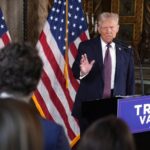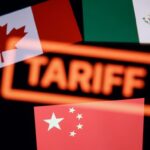By Tom Ozimek
President Donald Trump has said that the United States would end its dependence on China for rare-earth minerals within 18 months under an “emergency program” to build domestic and allied supply chains, describing the initiative as a key national security priority following Beijing’s recent export restrictions.
In a Nov. 2 interview on CBS’s “60 Minutes,” Trump said his administration’s new rare-earth plan would ensure that the United States can meet all its industrial and defense needs in less than two years, citing new partnerships with Japan, Australia, and the United Kingdom.
“Within a short period of time, we‘ll have everything we need for ourselves,“ the president said. ”We’ve instituted an emergency program, and we will have—within a year from now to a year and a half—we’ll have everything we need, no matter what kind of a threat is being made.”
China dominates global rare-earth production and an even larger share of refining capacity, which Trump and officials in his administration have said poses a strategic vulnerability for the United States. The minerals are critical for a wide range of high-tech products, from smartphones and electric vehicles to fighter jets and guided missiles.
Beijing first weaponized rare earths by imposing export controls on Japan during a diplomatic dispute in 2010, and about a decade later began imposing export restrictions on strategic materials to the United States, including antimony, germanium, and tungsten.
In April this year, the Chinese Communist Party (CCP) expanded its export control list to include seven rare earths and magnets made from three of them, and on Oct. 9, it announced sweeping restrictions that covered products containing even trace amounts of rare earths, a situation Trump described as a hostile action against the entire world.
“This wasn’t a threat against the United States. This was really a threat against the world,” Trump said during the “60 Minutes” interview. “So the whole world has come together, I think, at our behest.”
Trump predicted that “within two years, rare earths will … really cease to be a problem.”
While China has agreed to pause its rare-earth export curbs for one year under a deal Trump recently struck with Chinese leader Xi Jinping, countries around the world have accelerated efforts to diversify their critical minerals supply chains away from China. In the weeks following the CCP’s threat to impose the export controls, there has been a surge of new policies, investments, and cross-border agreements aimed at securing alternative sources.
In the CBS interview, Trump said tariffs imposed under his emergency authority were instrumental in forcing China to suspend its export controls.
“Tariffs give us national security and great wealth,” he said. “When they pulled the rare earth [move] on us and the rest of the world … I immediately instituted a 100 percent tariff over and above what they were already paying. And when I did that, they immediately came to the table.”
Trump’s recent meeting with Xi at the Asia-Pacific Economic Cooperation summit in South Korea led to a deal that includes Washington dropping some levies and Beijing pausing rare-earth export controls and agreeing to ramp up purchases of U.S. agricultural products such as soybeans. While the terms of the agreement have not yet been made public, Trump said he expects them to be renegotiated yearly.
Race to Replace China
In an interview on CNN’s “State of the Union” on Nov. 2, Treasury Secretary Scott Bessent echoed Trump’s remarks about fast-tracking efforts to achieve rare earth independence from China, saying that the export control threat galvanized the United States and its allies to “go at warp speed” in building alternative supply chains.
“They have been putting this plan together for 25, 30 years. And the U.S. has been asleep at the switch,” Bessent said, referring to China’s plans to weaponize rare earths. “And now this administration, we’re going to go at warp speed over the next one, two years.”
China’s dominance in the rare-earth sector includes roughly 70 percent of rare earth mining, 90 percent of separation and processing, and 93 percent of magnet manufacturing, according to the Center for Strategic and International Studies.
Bessent said that the CCP’s dominance in the critical minerals sector is a “sword” held over the whole world—and that now is a time for urgent action to mitigate this threat.
“We have rallied the allies, and so it is going to be all the Western democracies, the Asian democracies, and India are also going to join us in this, in trying to form our own supply chains,” Bessent said.
“We don’t want to decouple from China, but we need to de-risk. They have shown themselves to be an unreliable partner in many areas.”
Since returning to office in January, Trump has sought to rebuild U.S. capacity in critical materials by streamlining permits for mining projects and funding new processing facilities. His administration has also encouraged allies to coordinate investments to reduce global dependence on Chinese supplies.
In a separate interview with the Financial Times, Bessent said that the speed of these initiatives means that the CCP’s ability to use rare earths as economic leverage will fade within a year or two.





